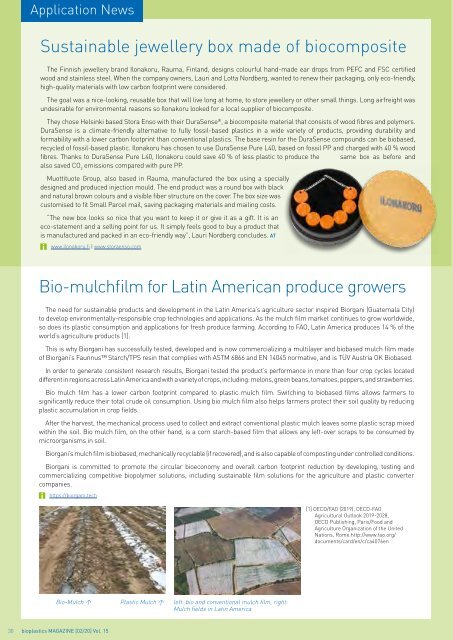Issue 02/2020
Highlights: Agri-/Horticulture Thermoforming Rigid Packaging Basics Land use (update)
Highlights:
Agri-/Horticulture
Thermoforming
Rigid Packaging
Basics
Land use (update)
You also want an ePaper? Increase the reach of your titles
YUMPU automatically turns print PDFs into web optimized ePapers that Google loves.
Application News<br />
Sustainable jewellery box made of biocomposite<br />
The Finnish jewellery brand Ilonakoru, Rauma, Finland, designs colourful hand-made ear drops from PEFC and FSC certified<br />
wood and stainless steel. When the company owners, Lauri and Lotta Nordberg, wanted to renew their packaging, only eco-friendly,<br />
high-quality materials with low carbon footprint were considered.<br />
The goal was a nice-looking, reusable box that will live long at home, to store jewellery or other small things. Long airfreight was<br />
undesirable for environmental reasons so Ilonakoru looked for a local supplier of biocomposite.<br />
They chose Helsinki based Stora Enso with their DuraSense ® , a biocomposite material that consists of wood fibres and polymers.<br />
DuraSense is a climate-friendly alternative to fully fossil-based plastics in a wide variety of products, providing durability and<br />
formability with a lower carbon footprint than conventional plastics. The base resin for the DuraSense compounds can be biobased,<br />
recycled of fossil-based plastic. Ilonakoru has chosen to use DuraSense Pure L40, based on fossil PP and charged with 40 % wood<br />
fibres. Thanks to DuraSense Pure L40, Ilonakoru could save 40 % of less plastic to produce the same box as before and<br />
also saved CO 2<br />
emissions compared with pure PP.<br />
Muottituote Group, also based in Rauma, manufactured the box using a specially<br />
designed and produced injection mould. The end product was a round box with black<br />
and natural brown colours and a visible fiber structure on the cover. The box size was<br />
customised to fit Small Parcel mail, saving packaging materials and mailing costs.<br />
“The new box looks so nice that you want to keep it or give it as a gift. It is an<br />
eco-statement and a selling point for us. It simply feels good to buy a product that<br />
is manufactured and packed in an eco-friendly way”, Lauri Nordberg concludes. AT<br />
www.ilonakoru.fi | www.storaenso.com<br />
Bio-mulchfilm for Latin American produce growers<br />
The need for sustainable products and development in the Latin America’s agriculture sector inspired Biorgani (Guatemala City)<br />
to develop environmentally-responsible crop technologies and applications. As the mulch film market continues to grow worldwide,<br />
so does its plastic consumption and applications for fresh produce farming. According to FAO, Latin America produces 14 % of the<br />
world’s agriculture products [1].<br />
This is why Biorgani has successfully tested, developed and is now commercializing a multilayer and biobased mulch film made<br />
of Biorgani’s Faunnus Starch/TPS resin that complies with ASTM 6866 and EN 14045 normative, and is TÜV Austria OK Biobased.<br />
In order to generate consistent research results, Biorgani tested the product’s performance in more than four crop cycles located<br />
different in regions across Latin America and with a variety of crops, including: melons, green beans, tomatoes, peppers, and strawberries.<br />
Bio mulch film has a lower carbon footprint compared to plastic mulch film. Switching to biobased films allows farmers to<br />
significantly reduce their total crude oil consumption. Using bio mulch film also helps farmers protect their soil quality by reducing<br />
plastic accumulation in crop fields.<br />
After the harvest, the mechanical process used to collect and extract conventional plastic mulch leaves some plastic scrap mixed<br />
within the soil. Bio mulch film, on the other hand, is a corn starch-based film that allows any left-over scraps to be consumed by<br />
microorganisms in soil.<br />
Biorgani’s mulch film is biobased, mechanically recyclable (if recovered), and is also capable of composting under controlled conditions.<br />
Biorgani is committed to promote the circular bioeconomy and overall carbon footprint reduction by developing, testing and<br />
commercializing competitive biopolymer solutions, including sustainable film solutions for the agriculture and plastic converter<br />
companies.<br />
https://biorgani.tech<br />
[1] OECD/FAO (2019), OECD-FAO<br />
Agricultural Outlook 2019-2<strong>02</strong>8,<br />
OECD Publishing, Paris/Food and<br />
Agriculture Organization of the United<br />
Nations, Rome.http://www.fao.org/<br />
documents/card/en/c/ca4076en<br />
Bio-Mulch ↑<br />
Plastic Mulch ↑<br />
left: bio and conventional mulch film, right:<br />
Mulch fields in Latin America<br />
30 bioplastics MAGAZINE [<strong>02</strong>/20] Vol. 15


















